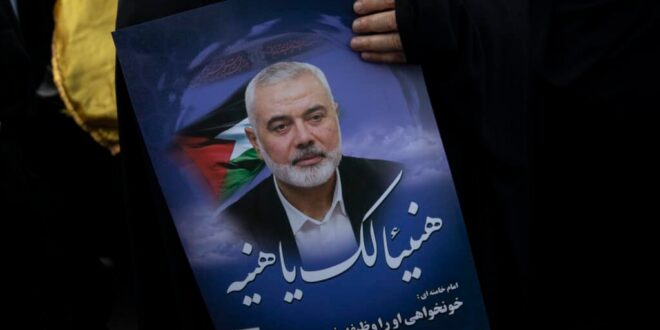Latest Developments
The strike in Tehran on July 31 that killed Ismail Haniyeh, Hamas’s most senior political leader, brings to four the number of Hamas’s top leaders eliminated since the October 7 atrocities in southern Israel. Prior to the killing of Haniyeh — who was in Tehran for the inauguration of Iran’s new president, Masoud Pezeshkian, alongside the leaders of other Iranian terror proxy groups — Israel had already eliminated Hamas’s deputy political chief, Saleh al-Arouri, deputy chief of military operations Marwan Issa, and the commander of Hamas’s al-Qassam Brigades, Mohammed Deif. Haniyeh’s death came just hours after Israel eliminated Fuad Shukr, also known as “Sayyid Muhsan,” in the southern suburbs of Beirut. Shukr was the most senior military commander of Iranian-backed Hezbollah in Lebanon.
Expert Analysis
“Since the devastating atrocities of October 7, the leaders of Hamas have been living on borrowed time. In addition to Haniyeh, Israel has this year also eliminated Saleh al-Arouri in Beirut and Marwan Issa and Mohammed Deif in Gaza. The world now understands that Israel is serious about destroying Hamas and, more broadly, removing the grave threat posed by Iran’s proxies once and for all.” — Mark Dubowitz, FDD CEO
“Despite Hamas suffering significant blows in recent weeks against its leadership in Gaza and abroad, there is more work that lies ahead if the Jewish state wants to achieve its remaining objectives. Nonetheless, momentum has shifted significantly in Israel’s favor, and it is now in a position of strength to negotiate a deal for the remaining hostages still being held in Gaza.” — Joe Truzman, Senior Research Analyst at FDD’s Long War Journal
Israel Pursues Terror Leaders in Gaza, Lebanon, and Beyond
Israeli Prime Minister Benjamin Netanyahu stated in October that “every member of Hamas is a dead man.” In the months since, Israel has endeavored to fulfill that prediction. Israeli Defense Minister Yoav Gallant announced in March that Israel also planned to pursue Hezbollah. “We are turning from pushing back [Hezbollah] to hunting it. Everywhere Hezbollah is found, we reach,” Gallant said.
On January 2, Hamas’s third-most senior figure, Saleh al-Arouri, was killed in a Beirut strike that Lebanese authorities blamed on Israel. After a period of being headquartered in Turkey, Arouri relocated to Lebanon, where he spearheaded Hamas’s coordination with Hezbollah and their shared Iranian patron.
On March 10, Israel carried out a precision airstrike in the central Gaza Strip town of Nuseirat targeting Marwan Issa, the deputy chief of Hamas’s military operations. On July 13, Israel targeted Hamas military chief Muhammed Deif and the commander of Hamas’s Khan Younis brigade, Rafa’a Salameh. Israel considers Deif to be one of two masterminds behind Hamas’s October 7 onslaught. Deif had survived at least six previous assassination attempts. Salameh “played a significant role” in operations such as the cross-border abduction of Israeli soldier Gilad Shalit in 2006. In 2016, Salameh took over the Khan Younis Brigade from Mohammed Sinwar, brother of Hamas’s Gaza chief, Yahya Sinwar.
Additionally, Israel killed Mohammed Reza Zahedi, a senior commander of Iran’s Islamic Revolutionary Guard Corps (IRGC), in a Damascus airstrike on April 1. Zahedi was most recently believed to be serving as chief of the IRGC’s elite Quds Force in Syria and Lebanon — a role that would have made him a top coordinator between Tehran and Hezbollah.
Hamas Leaders Who Remain At Large
Israeli Defense Minister Yoav Gallant said in October that “Hamas terrorists have two options: Be killed or surrender unconditionally.” Despite the killing or capturing of thousands of terrorists, at least three of Hamas’s top leaders remain alive: Yahya Sinwar, Mohammed Sinwar, and Khaled Meshal.
Yahya Sinwar has served as Hamas’s political leader in Gaza since 2017. Israel considers him to be the main mastermind of Hamas’s October 7 assault. Sinwar was serving multiple life terms for the killing of two Israeli soldiers when Israel released him in 2011 as part of a deal to free Israeli soldier Gilad Shalit, whom Hamas had held captive for five years.
Mohammed Sinwar was involved in planning several suicide bombing attacks in the mid-1990s that claimed dozens of Israeli lives. He became the commander of Hamas’s Khan Younis Brigade in 2005. Sinwar oversees Hamas’s military command structure in southern Gaza and was unsuccessfully targeted by Israel during the May 2021 Gaza war, during which he admitted to coordinating with Iran and Hezbollah
Khaled Meshal is a founding member of Hamas. He became the group’s external political chief in 2004 and was appointed in 2021 to fill a new role within Hamas, effectively its foreign minister. In 1997, Israel attempted to assassinate Meshal in Jordan. He is currently based in Qatar. Meshal is on the short-list to succeed Haniyeh as the principal political leader of Hamas.
 Eurasia Press & News
Eurasia Press & News



